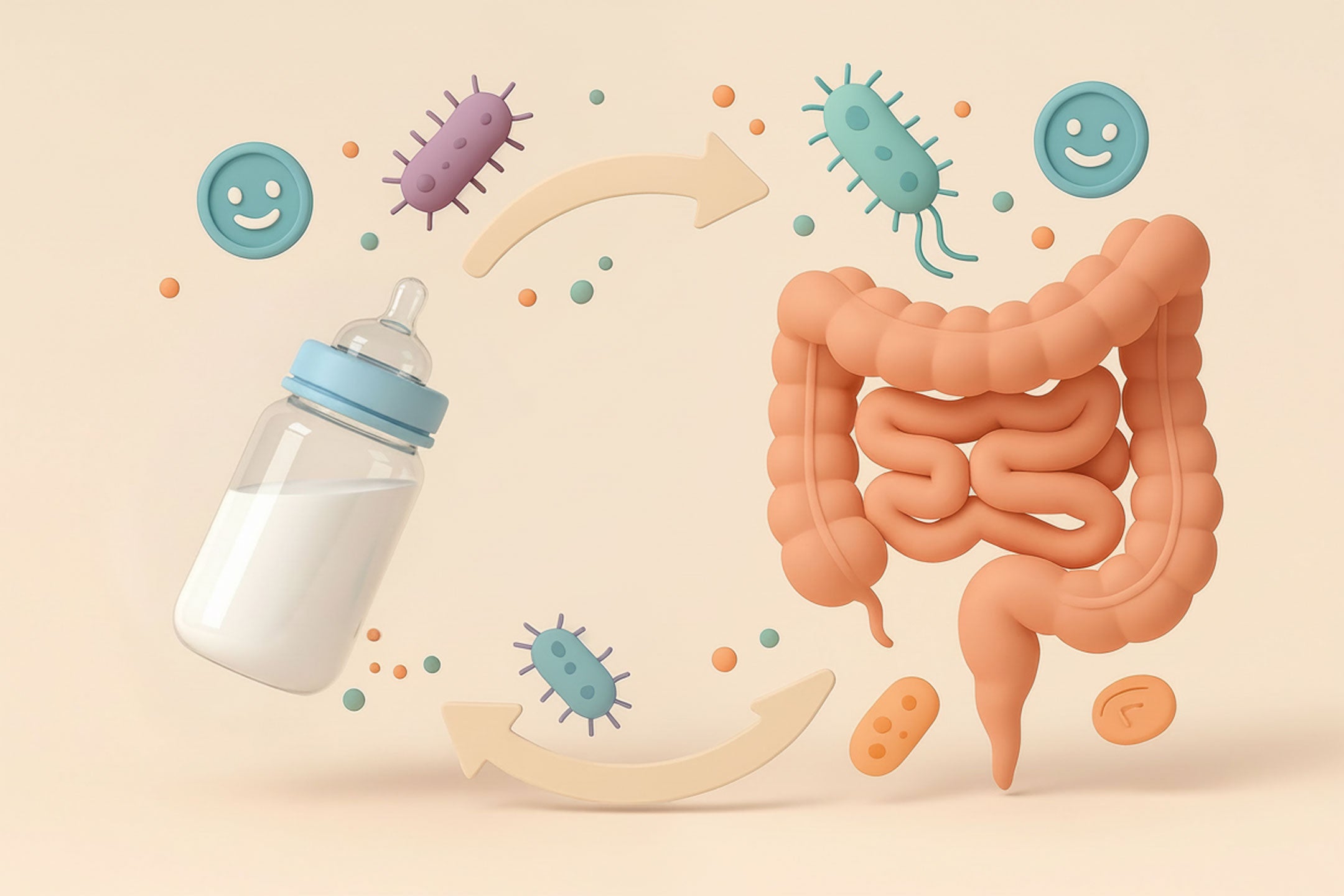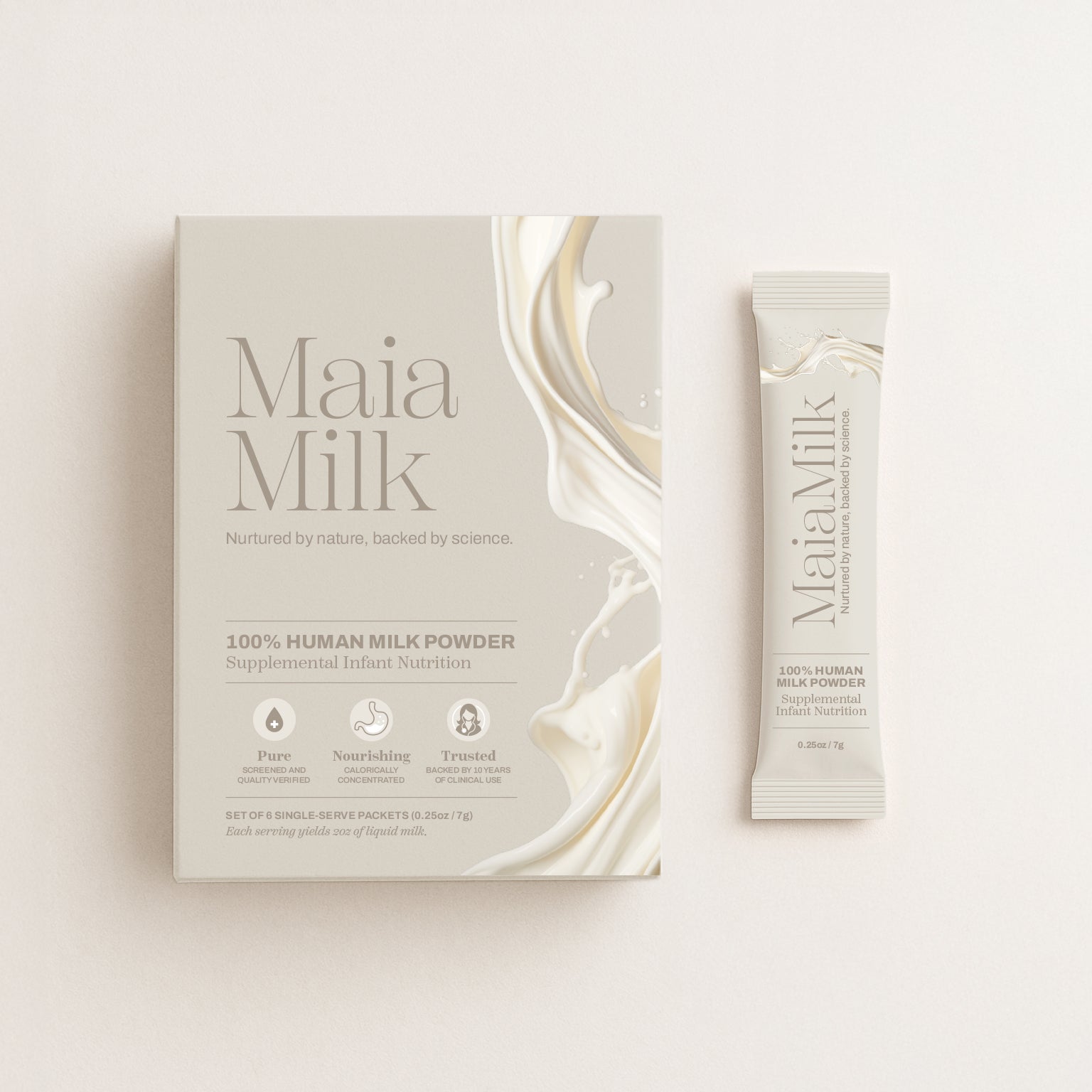The Gut Begins Here
From the very first feed, breast milk does more than nourish — it programs. Rich in prebiotics, beneficial bacteria, and bioactive compounds, human milk plays a critical role in shaping your baby's gut health and immune system for life.

Breast Milk: The First Microbiome Architect
Babies are born with a nearly sterile gut. Breast milk introduces the first microbial populations — including beneficial bacteria like Bifidobacteria — that form the foundation of a healthy microbiome.
• Breast milk delivers live microbes and prebiotics (like HMOs) that selectively feed the “good” bacteria.¹
• These beneficial bacteria help crowd out pathogens, reduce inflammation, and train the immune system to distinguish between friend and foe.²
The Role of HMOs
Unique to human milk, HMOs (Human Milk Oligosaccharides) are the third largest solid component in breast milk — yet babies can't digest them. Instead, they serve a critical purpose:
Feed beneficial bacteria like Bifidobacterium infantis, promoting a healthy microbial balance.³
Prevent pathogen adhesion by mimicking cell receptors, effectively blocking harmful bacteria from binding to the infant’s gut lining.⁴
Modulate immunity and reduce risk of infections, allergies, and inflammation.⁵
Formula-fed infants may lack the diversity and density of protective microbes due to absence or lower levels of HMOs.⁶

Gut Integrity & Immune Education
A well-nourished microbiome is essential for a strong intestinal barrier — the thin layer that protects the body while allowing nutrient absorption.
• Breast milk contains secretory IgA, lactoferrin, and growth factors that fortify the gut lining and prevent “leaky gut.”⁷
• These components support tight junction development in the gut wall, critical in preventing systemic inflammation and future autoimmune risks.⁸
• Breast milk also trains the mucosal immune system, which houses 70–80% of immune cells.⁹
Clinical Outcomes: Breastfed vs. Formula-fed Microbiomes
Research shows dramatic differences between breastfed and formula-fed infants:
| Breastfed Infants | Formula-Fed Infants |
|---|---|
| Dominated by Bifidobacteria | Higher levels of Clostridia, E. coli, and other pathogens10 |
| Lower gut pH, inhibiting pathogens | Higher gut pH, allowing pathogen growth11 |
| Stronger gut barrier development | Delayed barrier function12 |
| Reduced incidence of NEC, colic, and eczema | Higher risk of GI infections and inflammatory disorders13 |

Clinically Proven. Naturally Designed.
Breast milk is nature’s most advanced microbiome-support system — unmatched in its complexity, bioactivity, and lifelong benefits. At MaiaMilk, we preserve this brilliance through gentle freeze-drying, delivering real human milk with its microbiome-nourishing components intact.
1. Milani C, et al. (2017). "The First Microbial Colonizers of the Human Gut: Composition, Activities, and Health Implications of the Infant Gut Microbiota."Microbiology and Molecular Biology Reviews. 81(4). | 2. Walker WA. (2017). "Initial intestinal colonization in the human infant and immune homeostasis."Annals of Nutrition and Metabolism. | 3. Zivkovic AM, et al. (2011). "Human milk glycobiome and its impact on the infant gastrointestinal microbiota."Proceedings of the National Academy of Sciences. | 4. Bode L. (2012). "Human milk oligosaccharides: every baby needs a sugar mama."Glycobiology. 22(9). | 5. He Y, et al. (2016). "Human milk oligosaccharides enhance the gut barrier function and reduce inflammation."Journal of Pediatric Gastroenterology and Nutrition. | 6. Donovan SM, et al. (2019). "The Role of Human Milk Oligosaccharides in Gut Health and Neonatal Necrotizing Enterocolitis Prevention."Nutrients. | 7. Newburg DS, et al. (2005). "Role of human-milk lactadherin in protection against symptomatic rotavirus infection."The Lancet. 355(9225). | 8. Arrieta M-C, et al. (2014). "The intestinal microbiome in early life: health and disease."Frontiers in Immunology. | 9. Macpherson AJ, et al. (2012). "Mucosal immunity and the regulation of the gut microbiota."Nature Reviews Immunology. | 10. Penders J, et al. (2006). "Factors influencing the composition of the intestinal microbiota in early infancy."Pediatrics. | 11. Harmsen HJM, et al. (2000). "Development of the intestinal bacterial composition in healthy term infants fed with different types of infant formula or human milk."Applied and Environmental Microbiology. | 12. Neu J, Walker WA. (2011). "Necrotizing enterocolitis."The New England Journal of Medicine.














